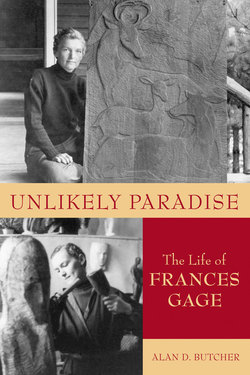Читать книгу Unlikely Paradise - Alan D. Butcher - Страница 7
На сайте Литреса книга снята с продажи.
ОглавлениеACKNOWLEDGEMENTS
I WOULD FIRST LIKE TO thank my editor at Dundurn Press, Allison Hirst, without whose keen eye and boundless expertise this book would have been the poorer. Her recommendations and rare common sense made so much difference. In addition, I would particularly like to thank Dorette Carter, curator of the Art Gallery of Northumberland, for her time and the information she provided in what was the first interview for the journey taken in these pages. Marnie Williamson, Frances’s classmate during the years at the former Ontario College of Art, added priceless background colour to those early days. Clare MacKay’s comments proved invaluable, as did those of Malcolm Wardman.
Rebecca Sisler has been Frances’s friend for many years, and her book Passionate Spirits: A History of the Royal Canadian Academy of Arts gave me hours of reading enjoyment and, not incidentally, important material for this book.
Repeated proofreading, both by me and by others, has corrected errors and improved many a lazy paragraph. Any that remain are no one’s fault but mine. If I have overlooked a source, I apologize, and assure you your contribution is no less appreciated. There will always be errors and oversights in any manuscript. In such cases I must put myself at the mercy of the court of common sense. In many instances the only readily available source of information was my subject herself. To search out and confirm the correct spelling of a name, a name that occurred only once, might often have taken days, if not weeks. May I plead the obvious? There are just so many hours in a day, so many years in a lifetime. If I still stand accused, then I must shrug and accept guilt.
There has been a recent brouhaha over writers who have lied in the writing of biographies. There seems to be a tendency among some to turn to their lawyers when a memoir or biography calls fabrication fact, when every word is not historically true, when every quote is not word for word as uttered by the persons involved. I have not consciously sought lies to stand as truth but as Francis Bacon told us four hundred years ago, anyone undertaking a work such as the one at hand “cannot but meet with many blanks and spaces which he must be forced to fill up out of his own wit and conjecture.” I have indeed quoted people as having said this or that as much as half a century ago, and no, I cannot prove their remarks are correct and verbatim. Fifty years is a long time, and those who may have supposedly expressed those views are no longer with us to refute, modify, or confirm them. For literary purposes, I have “quoted” them; quotes, other than those attributed to Frances, are, in most instances, inventions. But all these quotes reflect what the characters might easily have said under the circumstances, in words I feel could have been theirs, expressing intentions or beliefs they probably would have held. In many instances I have fabricated remarks by Frances herself that were never recorded or uttered by her, but these, too, express what I believe she could have said, given the feelings and views expressed in her volumes of correspondence and a half-century of daily records. If you feel I’m wrong in doing this, you are entitled to your opinion, and like Voltaire, I will defend to the death your right to express it.
I have assiduously tried to avoid libel in my own statements and those attributed to others. At one point Frances referred to a confrere as “a prick.” Ever on the lookout for offensive material, I deleted it. However, I am dealing with the life of a human being, with all that implies; an offensive word or phrase may have slipped through the cracks, or indeed I may have used it because I felt it was apropos. If a reader gasps with outrage, I recommend revisiting the “offensive” material; I think you will find, on reflection, I am justified.
